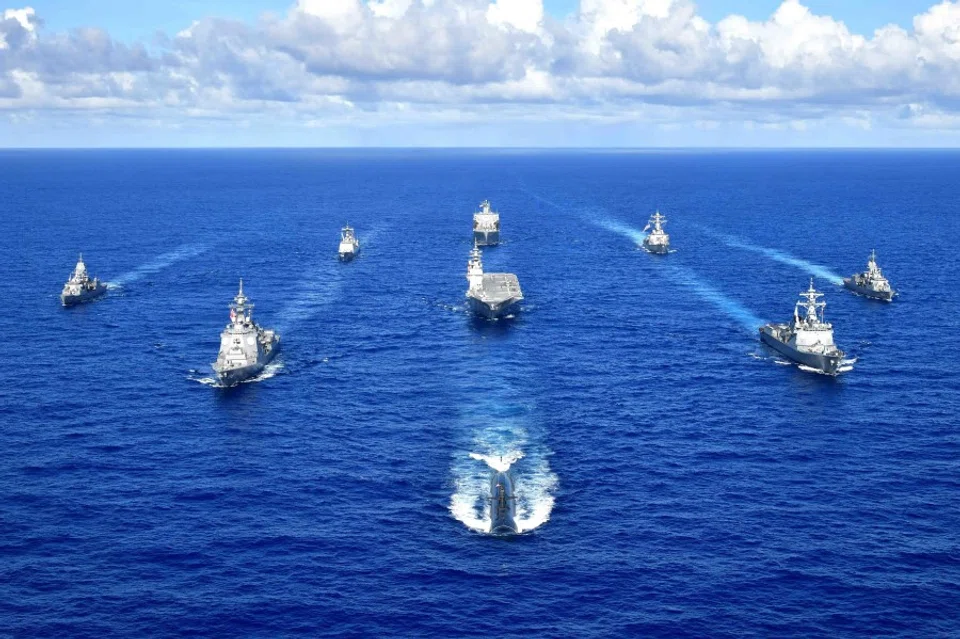Japan's diplomatic note to counter China's growing assertiveness in South China Sea
Academic Nguyen Hong Thao observes that Japan's latest note verbale to the United Nations on the South China Sea was done out of its national interest. Nonetheless, it shows that Tokyo - and a growing coalition of countries - are digging in their heels to uphold the aegis of international law in the region.

The diplomatic row over the South China Sea dispute initiated by Malaysia in December 2019 continues to heat up. On 19 January, Japan submitted yet another note verbale to the growing list of note verbales issued by other countries including Malaysia. In it, Japan specifically directs its ire against Chinese claims expressed in its note verbale (Note CML/63/2020 on 18 September 2020), as well as China's earlier notes.
Japan's views in its latest note are largely in line with the positions of many other countries regarding the maritime disputes in the South China Sea. Since December 2019, countries which have filed submissions to the UN include Australia, Indonesia, Malaysia, the Philippines, the US and Vietnam. In September 2020, France, Germany and the UK made a joint submission.
These notes, including the recent one by Japan, have raised six main points:
i) it is necessary to accept the universal and unified character of the 1982 United Nations Convention on the Law of the Seas (UNCLOS) that sets out the legal framework with which all activities in the oceans and seas must comply; ii) the award of the South China Sea Arbitration dated 12 July 2016 is final and binding on the parties to the dispute, namely the Philippines and China; iii) the freedom of navigation and overflight in the South China Sea must be respected; iv) the method of archipelagic baselines applies only to archipelagic states and cannot be applied in an unlawful way to the offshore islands of a coastal country; v) land building activities or other forms of artificial transformation cannot change the classification of a feature under UNCLOS; and vi) claims concerning the exercise of "historic rights" over the South China Sea waters do not comply with international law and UNCLOS.

In its recent note, Japan also specifically highlighted three issues: the application of archipelagic baselines, the legal status of low tide elevations, and the freedom of overflight.
In its note CML/63/2020 in September 2020, China argued that there is already a long-established practice in international law related to continental states' outlying archipelagos and that such a practice should be respected. This is how China justified its application of the archipelagic baselines to not only Vietnam's Paracel Islands* on 15 June 1996, but also to the disputed Senkaku/ Diaoyu islands on 10 September 2012. To counter China's position, Japan's note states, quite unequivocally, that there is "no room for a State Party to justify the application of baselines that do not satisfy the conditions stipulated under UNCLOS".
Japan also maintains the view that low tide elevations** in the Spratly Islands cannot enjoy the legal status of islands or rocks. As such, they do not have either a territorial sea or territorial airspace of their own. Therefore, China's objection to the freedom of overflight of Japanese aircraft in the airspace over Mischief Reef and its attempt to restrict the right of overflight in the South China Sea are unacceptable. This is the first time Japan has provided concrete evidence on China's attempt to restrict Japan's freedom of overflight in the South China Sea. As such, Japan's action also implies that it is opposed to China's reported plans to establish an air defence identification zone (ADIZ) in the South China Sea.

Granted, Japan did not submit the note out of pure altruism; primarily, the note is meant to serve its own national interests. At the same time, however, it also serves the purpose of coordinating Japan's views with those of other like-minded countries to deter China's excessive behaviours that threaten peace, stability, and development in the region as well as the freedom of navigation and overflight in the South China Sea.
With Japan's participation, there is a clear and emerging consensus among most countries across the region that emphasises the importance of the international law of the sea, especially UNCLOS, in addressing regional maritime disputes.
Internationalisation of the South China Sea dispute
The views expressed in Japan's note is largely in line with ASEAN's views. At the 37th ASEAN Summit in 2020, the Chairman's Statement highlighted the role of UNCLOS as the basis for determining coastal countries' maritime entitlements, sovereign rights, jurisdiction, and legitimate interests over maritime zones. All activities in the oceans and seas must be carried out in accordance with the legal framework established by UNCLOS. It also implied that any historic right claims and the combination of dispersed features in the South China Sea into a single unit are illegal under UNCLOS. The ASEAN Chairman's statement at the 37th ASEAN Summit in November 2020 recalled also the United Nations General Assembly Resolution A/RES/74/19 emphasising the universal and unified character of the 1982 UNCLOS.
In this context, Japan's Note No. SC/21/002 contributes to the internationalisation of the South China Sea dispute against China's wishes. With Japan's participation, there is a clear and emerging consensus among most countries across the region that emphasises the importance of the international law of the sea, especially UNCLOS, in addressing regional maritime disputes. Such a unified and consistent regional stance creates a strong narrative and foundations for collective actions that contribute to the maintenance of the rules-based international order essential to the region's peace and stability. It is also a meaningful development given that China passed a law on 22 January 2021. This gave legal cover to the Chinese coast guard to fire on foreign vessels and investigate all maritime activities of other states that China deems to go against its claims.

The timing of Japan's note is also notable. It was sent on the eve of new Biden administration. With Chinese Foreign Minister Wang Yi touring nine ASEAN countries in January 2021, the note seems to be part of the intensifying competition for regional influence among the major powers. It represents Japan's efforts to coordinate with key countries in the region to counter China's growing assertiveness in both the East China Sea and the South China Sea. Moreover, it is also a concrete action to implement the policies highlighted in Japan's defence white paper released in July 2020. The document opposes any escalation of tensions in the East and South China Seas and rejects any unilateral attempt to settle the disputes in the South China Sea and the East China Sea through the use or threat of force. At this, ASEAN member states should be encouraged that there is a growing coalition of countries upholding the aegis of international law in the region.
*The Paracel Islands, known as the Xisha Islands in China and the Hoang Sa archipelago in Vietnam, are a group of islands currently controlled by China but also claimed by Taiwan and Vietnam.
**According to UNCLOS, a low-tide elevation is a "naturally formed area of land which is surrounded by and above water at low tide but submerged at high tide".
This article was first published by ISEAS - Yusof Ishak Institute as Fulcrum Commentary "Japan's Diplomatic Note on the South China Sea: Internationalising the Dispute Amid Chinese Pressure" by Nguyen Hong Thao.
Related: Should China station fighter jets in the South China Sea? | Indonesia crosses swords with China over South China Sea: 'Bombshell to stop China's expansionism'? | Apart from ASEAN and China, international community and law are part of South China Sea discourse | [South China Sea] Pandemic and US-Japan support reasons for Indonesia's strong stance on SCS



![[Photos] Fact versus fiction: The portrayal of WWII anti-Japanese martyrs in Taiwan](https://cassette.sphdigital.com.sg/image/thinkchina/3494f8bd481870f7c65b881fd21a3fd733f573f23232376e39c532a2c7593cbc)

